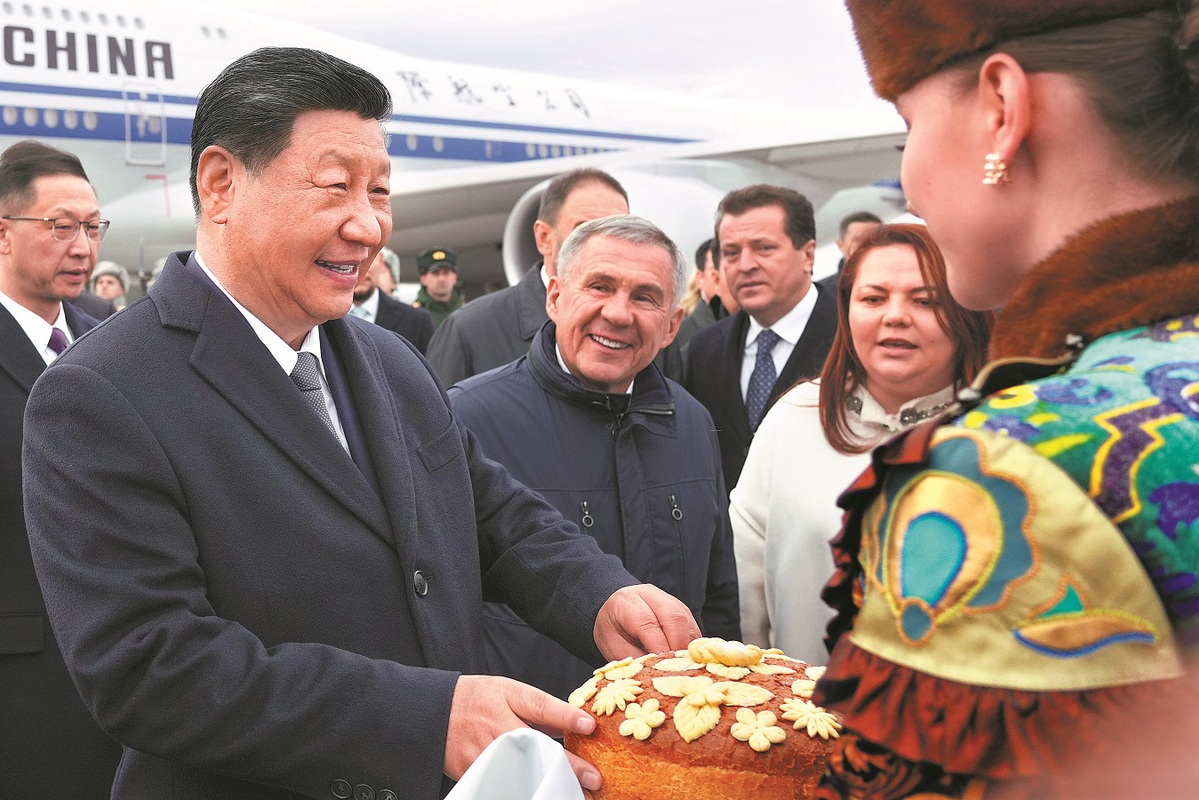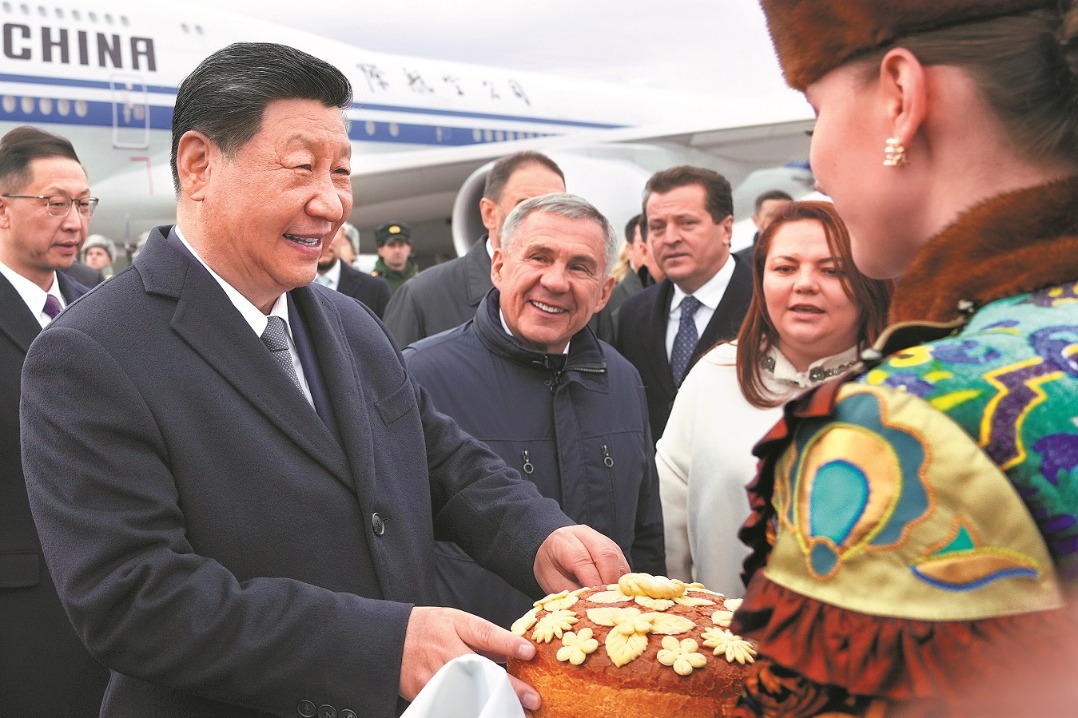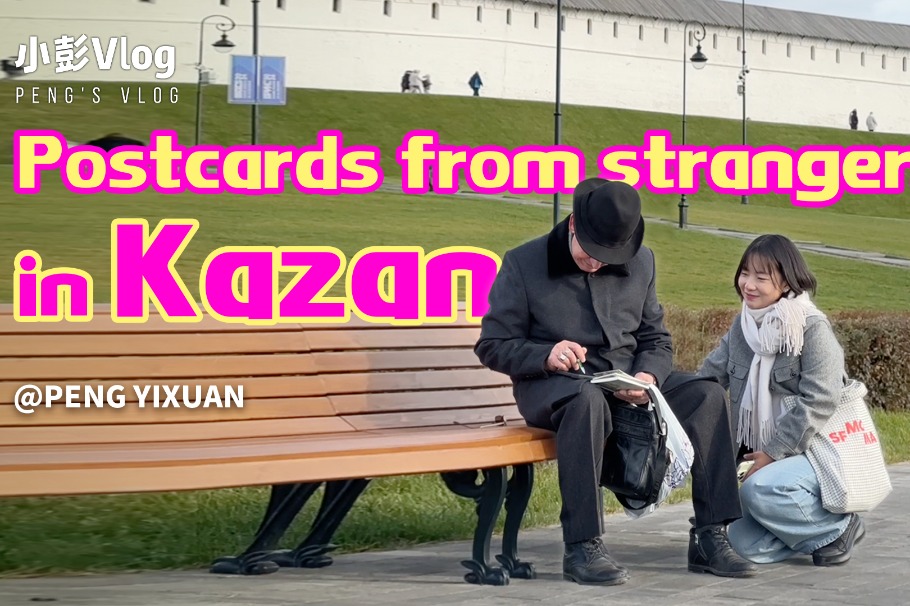Brick by brick, president drives BRICS cooperation


As President Xi Jinping and a host of other leaders gather in Kazan, Russia, for the 16th BRICS Summit, the world is once again shining the spotlight on the burgeoning international mechanism for how it will push forward self-development and respond to global woes.
A steadfast champion of BRICS cooperation, Xi once compared its five members at that time to the five fingers of one hand: They are short and long if extended, but form a powerful fist if clenched together.
Now that hand has grown bigger and stronger, after the announcement of BRICS' historic expansion last year, yet the essence of Xi's metaphor is becoming even more relevant.
With the world trudging on in a new period of turbulence and transformation, the leader of the largest developing country is poised to help guide BRICS, the leading echelon of the Global South, to play a bigger role in building a better shared future for humanity.
Golden value
BRICS, an acronym for Brazil, Russia, India, China and South Africa, is literally called "gold bricks" in Chinese, indicating the optimism about its great potential and shining future.
The sanguine view features prominently in Xi's engagement with the group. He has consistently placed BRICS high on China's foreign policy agenda. His first appearance on the multilateral stage as China's head of state was at the 2013 BRICS summit in Durban, South Africa, and he visited all four other BRICS countries during the first two years of his presidency.
"China led by President Xi Jinping has contributed significantly to the success of BRICS," noted Bunn Nagara, a senior China researcher in Malaysia.
Thanks to the joint efforts of its members, the golden value of BRICS has continued to rise. World Bank data shows that the share of BRICS in global GDP grew from 18 percent in 2010 to about 26 percent in 2021, with increases in all years during the period.
Among the drivers of its remarkable growth is a strong orientation toward real results. "BRICS is not a talking shop, but a task force that gets things done," Xi once emphasized.
Following this spirit, practical cooperation has always been the foundation of the BRICS mechanism, a good example of which is the launch of the New Development Bank. The multilateral institution, whose headquarters is in Shanghai, had approved 105 projects in all member countries for approximately $35 billion by the end of 2023.
In view of BRICS' evolving development needs, Xi, at the 2017 summit in China's coastal city of Xiamen, Fujian province, joined other member leaders in formally incorporating cultural and people-to-people exchanges into the engines of BRICS cooperation, in order to further enhance the bond between these nations and reinforce the foundation of BRICS interaction.
Powered by the three engines of political and security exchanges, economic and financial exchanges and cultural and people-to-people exchanges, BRICS cooperation has witnessed even more substantial progress and growing popular support.
Wang Lei, director of the BRICS Cooperation Research Center at Beijing Normal University, said that the unique value of BRICS cooperation goes beyond economic terms, and the mechanism is an innovation of international cooperation, which is in marked contrast to some protectionist, exclusive political, military or economic alliances in the West.
In Xi's words, BRICS cooperation transcends the old formula of political and military alliances, the old mindset of drawing lines on the basis of ideology, and the obsolete notion of "you-win-I-lose" and "winner-takes-all".
The golden track record, as many observers have pointed out, has not only proved wrong various gloom-and-doom claims, but also significantly increased BRICS' appeal to the rest of the world.
Greater BRICS
On Aug 24 last year, the Sandton Convention Centre in Johannesburg, South Africa, erupted with applause upon the announcement of BRICS' historic expansion. That, Xi said at a news conference, demonstrated "the determination of BRICS countries and developing nations to unite".
Since the inception of the BRICS mechanism, openness and inclusiveness have remained its members' abiding commitment, and Xi has repeatedly emphasized that BRICS countries do not gather in a closed club or an exclusive circle. "A tree cannot make a forest," he said as early as at his BRICS summit debut in Durban in 2013. A year later, at the Fortaleza summit in Brazil, he proposed the "BRICS spirit" of openness, inclusiveness and win-win cooperation.
With such an open mind, the group developed a tradition of inviting leaders of other countries to its summits. Then, at the 2017 gathering in Xiamen, an ancient port city that has evolved into a dynamic hub in China's opening-up and reform, Xi built on that outreach practice and put for-ward the "BRICS Plus" program, encouraging more participation of other emerging markets and developing nations.
In fact, Xiamen happened to be where Xi went to work as deputy mayor in 1985 at the age of 32. Now, under Xi's initiative, an innovation base for BRICS partnership on the new industrial revolution has taken root there.
Over the years, with profound changes reshaping the world to a degree rarely seen in history, the Chinese president has unwaveringly championed openness and cooperation.
"Under the new circumstances, it is all the more important for BRICS countries to pursue development with open doors and boost cooperation with open arms," Xi said at the 14th BRICS Summit in 2022.
A year later, more than 60 countries gathered in Johannesburg for the 15th BRICS Summit. The gathering was "not an exercise of asking countries to take sides, nor an exercise of creating bloc confrontation", Xi said. Rather, it was "an endeavor to expand the architecture of peace and development", he noted.
Other than the countries that became new full members on Jan 1,2024, more than 30 nations have also formally applied to join BRICS, while many other developing countries are seeking deeper cooperation with the group.
"There is a reason why these countries choose to join BRICS," said Mekhri Aliev, a board director of the BRICS innovation base in Xiamen. "Because they see future, they see potentials and opportunities within BRICS."























